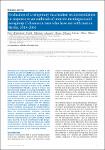Evaluation of a temporary vaccination recommendation in response to an outbreak of invasive meningococcal serogroup C disease in men who have sex with men in Berlin, 2013–2014
Koch, Judith
Hellenbrand, Wiebke
Schink, Susanne
Wichmann, Ole
Carganico, A.
Drewes, Jochen
Kruspe, Markus
Suckau, M.
Claus, H.
Marcus, Ulrich
Meningococcal serogroup C (MenC) vaccination of men who have sex with men (MSM) was temporarily recommended to control an outbreak of invasive MenC disease among MSM in Berlin in 2012–2013. Vaccination was offered to HIV-infected MSM free of charge; others had to request reimbursement or pay out of pocket. We aimed to assess (i) awareness and acceptance of this recommendation through an online survey of MSM, (ii) implementation through a survey of primary care physicians and analysis of vaccine prescriptions, and (iii) impact through analysis of notified cases. Among online survey respondents, 60% were aware of the recommendation. Of these, 39% had obtained vaccination (70% of HIV-infected, 13% of HIV-negative/non-tested MSM). Awareness of recommendation and vaccination were positively associated with HIV infection, primary care physicians’ awareness of respondents’ sexual orientation, and exposure to multiple information sources. Most (26/30) physicians informed clients about the recommendation. Physicians considered concerns regarding reimbursement, vaccine safety and lack of perceived disease risk as primary barriers. After the recommendation, no further outbreak-related cases occurred. To reach and motivate target groups, communication of a new outbreak-related vaccination recommendation should address potential concerns through as many information channels as possible and direct reimbursement of costs should be enabled.
No license information

